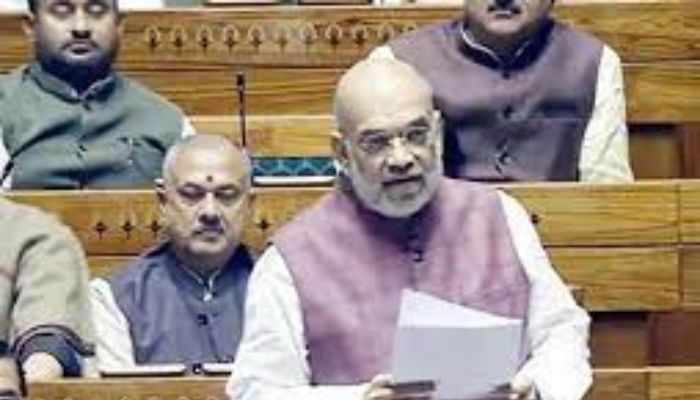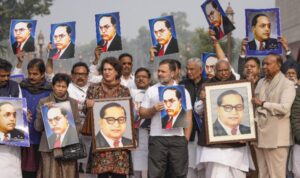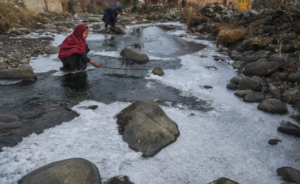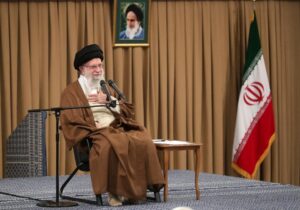With 5 nominations including KPs, PoJK refugee; J&K Assembly’s effective strength to go up to 95

Majority mark to be at 48 as nominated MLAs to have voting rights OBCs to get reservation for first time in UT, percentage to be finalized soon
Jammu : After Jammu and Kashmir Reorganization (Amendment) Bill, 2023 gets the President’s nod following approval by the Rajya Sabha, effective strength of the Jammu and Kashmir Legislative Assembly will go up to 95 while total strength will rise to 119 including 24 seats reserved for Pakistan occupied Jammu Kashmir (PoJK).
The bill was approved yesterday by the Lok Sabha following an impressive reply by Union Home Minister Amit Shah in which he declared that J&K will be terror-free by 2026 and that Prime Minister Narendra Modi will return to power in 2024.
This will be after two Assemblies that there will be at least two Kashmiri Pandit MLAs in the Jammu and Kashmir House. There was no Kashmiri Pandit MLA in the Legislative Assembly from 2008 to 2014 and from 2014 to 2018.
However, in 2008-2014 House, former Chief Secretary Vijay Bakaya was elected to the Legislative Council on NC mandate while in 2015-2018 Government, two KPs including Girdhari Lal Raina and Surinder Ambardar were elected as MLCs on BJP ticket.
The Assemblies of 1996 and 2002 had one KP MLA each – P L Handoo and Raman Mattoo, both of whom served as Ministers.
Besides two Kashmiri Pandits, the Reorganization (Amendment) Bill proposed nomination of a PoJK refugee in the Assembly.
There is already a provision for nomination of two Women in the House.
While election will be held for 90 Assembly seats including 47 in Kashmir division and 43 in Jammu division, the Lieutenant Governor of Jammu and Kashmir will have powers to nominate five persons to the Assembly including two each Kashmiri Pandits and Women and one PoJK refugee with voting rights, taking effective strength of the House to 95.
This will take majority mark in the Legislative Assembly to 48.
However, with 24 seats reserved for PoJK, strength of the Assembly will go up to 119. These seats will remain vacant till PoJK, which is an integral part of India, is taken back by India.
There is also demand from some of the PoJK organizations that at least one-third of 24 seats reserved for PoJK should be defreezed and given to occupied Kashmir’s inhabitants as vast population from that part of Kashmir had migrated here in 1947.
Meanwhile, Jammu and Kashmir Reservation (Amendment) Bill, 2023, which was also moved by Union Home Minister Amit Shah in Lok Sabha and passed by the House yesterday, will give reservation to Other Backward Classes (OBCs) for the first time in Jammu and Kashmir.
OBCs enjoy 27 percent reservation in the Central Government jobs and educational institutions. In most of the States and Union Territories also, OBCs have 27 percent reservation.
However, there was no reservation to OBCs in Jammu and Kashmir. Four percent reservation was given to Other Social Castes (OSCs). The OSCs will now be replaced by OBCs with inclusion of more castes and increase in percentage.
While percentage of reservation to be given to OBCs is yet to be decided, it is expected to be in two digits, as per the officials. They said the percentage will be finalized soon after the bill gets President’s nod following approval by the Parliament.
“This will fulfil long pending demand of OBCs for reservation in Government jobs and educational institutions to them,” the sources said.
The Government also proposed to introduce Women Reservation Bill for Jammu and Kashmir in the Parliament in the current session.
The bill seeks to reserve 33 percent seats out of total 90 in the Jammu and Kashmir Assembly for women which comes out around 29-30. Within the seats reserved for women, some seats could also be reserved for SC women and ST women.
Already in the House of 90, nine seats are reserved for Scheduled Tribes (STs) and seven for Scheduled Castes (SCs). Nearly 45-46 seats will be reserved in Jammu and Kashmir Assembly after the Women Reservation Bill is passed in the Parliament.
When the provisions of women reservation are made applicable to the Lok Sabha, one or two out of five LS seats in Jammu and Kashmir will also be reserved for the women, the sources said.
However, the Women Reservation in Lok Sabha and Assemblies is expected to come into force only after 2029.
Besides, two more bills pertaining to Jammu and Kashmir which were introduced in Lok Sabha during Monsoon session of the Parliament in July but were not taken up for pass motions, are likely to be taken up for the Parliament nod in the winter session.
One of the bill pertains to grant of Scheduled Tribe (ST) status to Pahari Ethnic Tribe, Paddari Tribe, Gadda Brahmans and Kolis. Another bill will include Valmikis in the list of Scheduled Castes.









